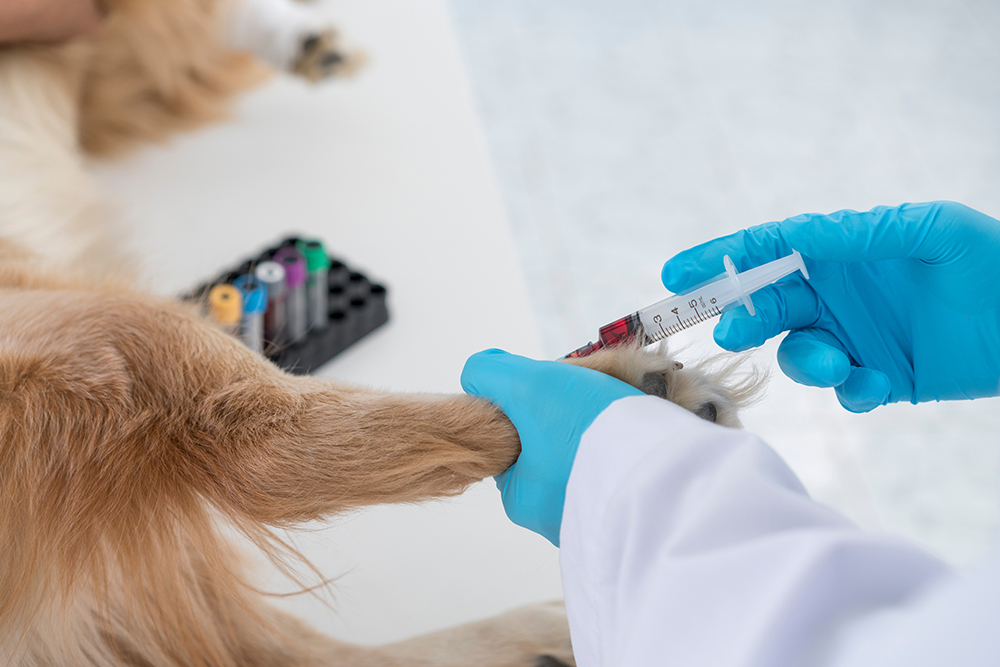Beyond Routine Testing: How Advanced Blood and Urine Tests Detect Hidden Health Issues in Pets
Routine wellness bloodwork and urinalysis are critical first steps in maintaining your pet’s health. However, what happens when those initial tests reveal something unusual—or when subtle health changes demand closer investigation?
At Valley Center Veterinary Clinic in Valley Center, California, we go beyond the basics. Through advanced diagnostic testing, we uncover hidden illnesses, catch disease in its earliest stages, and tailor treatments for longer, healthier lives.
This guide explores the critical advanced tests we use after routine screening—and how they can truly change outcomes for pets.
When Routine Testing Isn’t Enough
Annual blood panels (CBC, chemistry, urinalysis) are excellent starting points.
But if results show subtle changes—or if your pet is a senior, showing signs of illness, or a breed predisposed to disease—we often recommend more specific and sensitive diagnostics.
Common reasons to pursue advanced testing include:
- Mildly elevated kidney or liver values
- Protein in the urine
- Changes in thyroid function
- Increased drinking, urination, weight loss, or behavior changes
- Abnormalities detected on physical exams
Learn more: Why routine veterinary visits are important – AAHA
Going Deeper: Advanced Blood and Urine Testing
1. Urine Culture and Sensitivity Testing
- Why: If urinalysis suggests infection (bacteria, white cells, blood), a urine culture confirms if a true bacterial infection is present and identifies the most effective antibiotic.
- Importance: Prevents overtreatment with unnecessary antibiotics and properly manages urinary tract infections (UTIs).
Learn more about urinary tract infections – Embrace Pet Insurance
2. Urine Protein:Creatinine Ratio (UPC)
- Why: If we find protein in the urine (proteinuria), a UPC quantifies it to determine severity and whether kidney disease, glomerular disease, or hypertension is the cause.
- Importance: Detects early kidney dysfunction and helps guide treatment before symptoms appear.
Chronic Kidney Disease in Cats – Cornell Feline Health Center
3. Symmetric Dimethylarginine (SDMA)
- Why: This biomarker can detect kidney disease much earlier than creatinine levels.
- Importance: Catches kidney dysfunction months to years before traditional bloodwork shows changes.
Preventive testing for senior pets – Zoetis Petcare
4. Expanded Thyroid Testing: Not Just T4
- Free T4 by Equilibrium Dialysis: Measures only the active form of thyroid hormone, reducing false positives.
- TSH Measurement: Helps distinguish hypothyroidism from euthyroid sick syndrome (especially important in dogs).
- Importance: Provides a fuller picture of thyroid function, critical for accurate diagnosis.
Hypothyroidism in Dogs – Cornell University
Feline Hyperthyroidism Guidelines – AAHA
5. ProBNP Cardiac Biomarker Testing
- Why: Measures cardiac stress and heart muscle stretch, helping detect early heart disease even before radiographic changes.
- Importance: Essential in breeds prone to cardiomyopathy or when coughing or respiratory signs are unclear.
Heart disease diagnostics – Tufts Cummings School of Veterinary Medicine
6. Serum Allergy Testing
- Why: Identifies specific environmental allergens causing chronic skin or respiratory problems.
- Importance: Allows us to design targeted allergy therapy and immunotherapy for long-term control.
7. Genetic Disease Testing
- Why: Breeds like Boxers, Dobermans, Maine Coons, and Persians are prone to genetic diseases affecting the heart, kidneys, and more.
- Importance: Knowing your pet’s genetic risks guides screening, monitoring, and preventive care strategies before illness develops.
More about breed-specific health risks – Pawlicy Dictionary
How Advanced Testing Protects Your Pet’s Health
Early Diagnosis = Better Outcomes
Conditions like kidney disease, heart disease, diabetes, and thyroid disorders are much more manageable when caught early.
Advanced diagnostics allow us to:
- Start treatment before symptoms worsen
- Slow disease progression
- Improve quality and length of life
- Personalize treatment for each pet
Cost-Effective Over Time
Early detection often means less intensive and less expensive treatments compared to managing late-stage illness or emergencies.
When Should Advanced Testing Be Considered?
- Senior pets (7+ years old) during biannual exams
- Pets with unexplained weight changes, thirst changes, lethargy, or behavior changes
- After abnormal routine bloodwork results
- Pets belonging to high-risk breeds for genetic disease
- Chronic allergy or skin cases not improving with standard treatment
How Valley Center Veterinary Clinic Supports Your Pet
At Valley Center Veterinary Clinic, we offer a full spectrum of diagnostics, from baseline blood panels to advanced biomarker testing, imaging, and specialty referrals. We tailor our recommendations based on:
- Your pet’s species, breed, and age
- Existing health conditions
- Lifestyle and environmental factors
- Changes in clinical signs or routine test results
Book your pet’s comprehensive diagnostic consultation today.
Advanced Diagnostics Save Lives
Routine bloodwork and urinalysis are essential—but going deeper when needed is critical. Advanced testing gives us the power to catch diseases early, plan targeted treatments, and help your pet live their healthiest, happiest life.
Early action saves lives. Let’s work together to catch problems before they become crises.








Leave A Comment